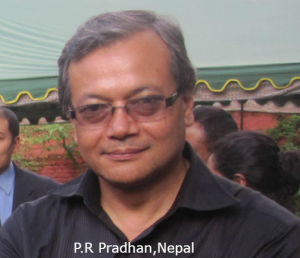–The then Royal Nepal Army and now Nepal Army is the oldest institution founded by Great king Prithivi Narayan Shah-
Pushpa Raj Pradhan
Chief editor
The People’s Review weekly
Kathmandu, Nepal

After the 1990 political change, many organs essential for the functioning of a nation including the civil service, Nepal Police, Nepali diplomacy, and government-run industries have been politicized and destroyed.
Finally, in 2008, the institution of monarchy, an institution safeguarding the Nepali sovereignty, independence and national integration was summarily removed. Fortunately, the (Royal) Nepal Army was able to retain although efforts for politicizing this force continue.
The then Royal Nepal Army and now Nepal Army is the oldest institution founded by Great king Prithivi Narayan Shah. This is the organ for safeguarding national security. This Army has a glorious history in the unification of modern Nepal.
Unfortunately, a section of people – known to be foreigners’ paid traitors – are continuously making efforts for weakening this institution. The total number of the Nepal Army at present is around 95 thousand. Nevertheless, the contribution of the Army in global peace-keeping missions, conducting rescue operations during times of natural calamity and disaster, construction of roads and treks and other infrastructural development based on security strategy is appreciable.
Unfortunately, Chief of Army Staff Gen Prabhuram Sharma had to condemn those “intellectuals”-who are lauding for reducing the present number of the Nepal Army and blame the organization become useless and a financial burden for the nation-making this institution non-functional.
Those “intellectuals” want to remove the Nepal Army institution giving the logic that Nepal doesn’t need to fight any war, therefore, there is no significance of the Army for the country. Understandably, those “intellectuals” are serving their foreign bosses who are feeding them.
 Our history speaks that Nepal is a country of warriors. Indian and British governments are still recruiting our warriors in their armies and they are identified as dutiful, obedient, brave and honest. However, our so-called intellectuals under the foreigners’ design, want to end employment opportunities for those warriors within the country.
Our history speaks that Nepal is a country of warriors. Indian and British governments are still recruiting our warriors in their armies and they are identified as dutiful, obedient, brave and honest. However, our so-called intellectuals under the foreigners’ design, want to end employment opportunities for those warriors within the country.
Meanwhile, a section of those retired Nepal Army officials and also the very “intellectuals” are blaming the Nepal Army for doing business rather than developing professional skills. Whether they are aware or not that within the region, the Indian Army, Pakistan Army, and Bangladesh Army are involved in many profit-making businesses including producing beer and running luxurious hotels. In Bangladesh, when some government-run industries were ruined, the government handed over the management to the Bangladesh Army and since then the industries have been earning profit. The national armies are contributing to the government by providing 18 to 25 per cent of the defence expenditure by paying revenue from the business operated by them.
Of course, this scribe believes that while doing business, professionalism should not be undermined and corruption practices should be curbed in the national army by developing effective mechanisms, however, in Nepal like country, the Army should be allowed to do independent business by utilizing the huge fund under the Nepal Army Welfare Fund. It is a matter of pride that the Nepal Army has decided to produce quality shoes needed for the Force.
Similarly, by developing an integrated mechanism among the three security organs-Nepal Army, Nepal Police and Armed Police Force-for establishing different industries including textile, which is consumed by themselves — by employing retired security personnel.
Currently, the Nepal Army is running hospitals and schools from which those present and retired Army personnel have benefited enormously. If the Force had not run such institutions, the government would have to bear the medical expenditure for Army personnel. The country has saved a big portion of funds due to the establishment of health and educational institutions by the Force.
Notably, the medical institution run by the Nepal Army is identified as the best institution in the country. One should not forget such contributions made by the Nepal Army by using its retired army personnel.
Due to the political intervention, all the government undertakings have been ruined. As result, the country is unable to give employment opportunities to the youths and they are going abroad for dirty jobs.
To end such a scenario, the government should permit the Nepal Army for using its welfare fund in establishing strategically important industries. The present number of the Nepal Army should be increased to one million and separate units for infrastructural construction, protection of the environment through tree plantation, utilizing land through cultivation, and preservation of the natural conservation sites should be developed from which the present unemployment problem can be resolved, in the meantime, domestic production can be increased by substituting imports, which will contribute the national economy enormously.
Unfortunately, can we expect efforts for strengthening the nation from those leaders in the government keen to serve foreigners’ interests? How has the Nepal Army observed such an adverse scenario and has it the courage for taking action against those traitors?
# Text courtesy: The People’s Review weekly dated March 29, 2023: Ed. Upadhyaya. N. P.
